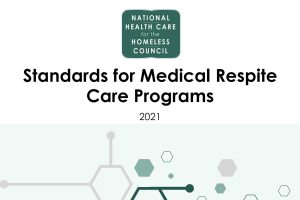Medical respite care is acute and post-acute medical care for people experiencing homelessness who are not ill enough to remain in a hospital, but are too ill to recover on the streets or in regular shelter settings. It offers a short-term, safe place to stay and person-centered care that allows people experiencing homelessness the opportunity to rest in a safe environment while accessing medical care and other supportive services. Medical respite care is offered in a variety of settings including freestanding facilities, homeless shelters, motels, nursing homes, and transitional housing (National Institute for Medical Respite Care, 2021). While all of these programs provide a critical service, they vary significantly in their scope and intensity of care. The Standards for Medical Respite Care Programs (the Standards) create a foundation for program operations that can be applied to any model of medical respite care. Despite the variances in service delivery, the person remains the central focus of the care provided.


